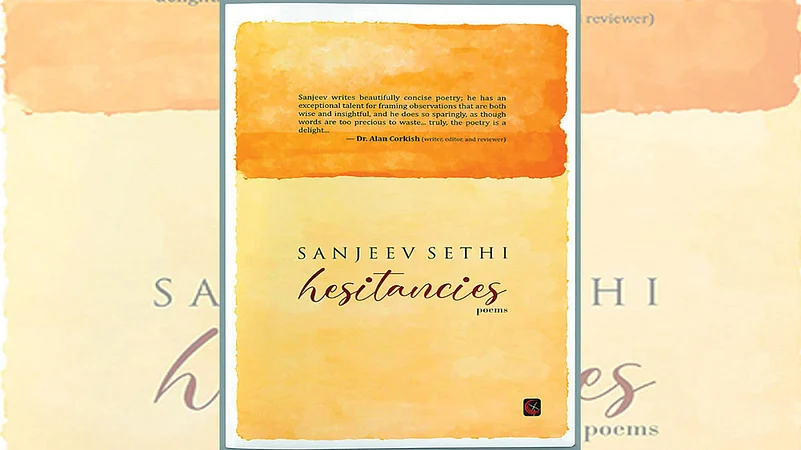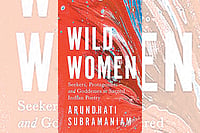Hesitancies captures the mood of our times—provisionality, uncertainty, doubt. Sanjeev Sethi’s poems held me captive by the sheer virtuosity of his language indulging in tentative excursions into the prism of modern living. The poem titled ‘2021’ bluntly asks questions about Covid-destroyed lives, therefore freshly-minted language: Have we as a collective betrayed ylem?/ The contagion of C-19 validates it/…We have altered vocabulary beyond repair./ The superbious us will have to correct this/or we will be sentenced to the stake. If one is looking for conventional poetry this volume will not offer it but its energy for mapping the “new normal” holds an infectious appeal.
Disquisitions on identity are as old as Plato but we need to refresh the terms. For globetrotters and cosmopolites, or for persons homebound in the pandemic, the self is supremely alone and cautiously guarded. Writes Sethi, I see myself in a supernumerary role/in the film of my fantasy/In meatspace/I’m the protagonist and antagonist. Philosophically speaking such individualism can be stretched to extremes, and what was once the romantic stance of a flâneur is today the cage of self-absorption. Hesitancies catches these conjectural advances of whether or not to associate with others, because love and myriad emotions are also dangerous traps of revelation, of vulnerability. The poem ‘Mist’ effectively illustrates the obscured meanings of love, intimacy, commitment, words from a bygone era of certitudes:
It seems I have sealed the sensations
of your touch as down payment of
an address we could never own or
occupy…Emblem of
affinity is like the sky: always there
intimacy breeds indifference; in its
own way, it keeps us knit.
As evident, much that society held sacrosanct is now under review, both due to societal evolution and the compulsions of modernity that have made us rethink the barriers between home and work, disease and health, spontaneity and prudence, ‘I’ and the ‘other’. Most of all, the meaning of home has changed. Instead of security and belonging, home is now a halting yard where a metaphorical suitcase is opened up with essentials and a notional laptop screen provides links to infinity. Short spells, robust without reason/hold their own to outbursts. For/a while there is home. This is thoughtful acceptance and a poetic view of the transitions that are now a part of life but implicit is the unease about those who are left behind, possibly the old and the infirm. Without being polemical, Sanjeev Sethi picturises the grim realities of a threatened geopolitics. The gap between the youth and the old, rich and poor is widening inexorably. Is it the poet’s role to be a redeemer of society? That too is a hesitancy.
“Poems are like progeny,” says Sethi, thereby alerting us to similarities as well as differences guided by the gene component that mutates without warning. Neologisms are one fascinating outcome, and unknown existing words are another. Take a line such as this: Gridiron of my growing years had you chasing epaulets. Each needs his needle.
“Gridiron” has multiple references: to football, theatre, surgery, territory mapping. Sethi believes in allusions not explanations and encourages a word search, a game play that is quite invigorating. “Glyph”, “archimage”, “trifecta” are some of the words I enjoyed following up though this activity is extraneous to enjoying the poetry. Sethi uses words like precious items not to be wasted, and displayed together in a poem they become valuable as in a jewel shelf.
Hesitancies is Sethi’s fifth collection of poems. Sharp as bullets and soft as silk, they touch each reader variously. Wordsmith, raconteur, witness to global change, Sanjeev Sethi writes with confident innovations.
(This appeared in the print edition as "For Better Or For Verse")
(Lal is an academic, editor and writer)


























